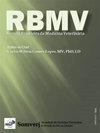象限动物健康监测一种新型智能农业监测系统
Q4 Veterinary
引用次数: 0
摘要
巴西是世界上最大的牛肉出口国,南马托格罗索州是巴西最重要的州之一,对动物生产至关重要。为了确保畜群的健康,所有联邦单位的牲畜保护部门都按照农业、牲畜和供应部的程序开展证券活动,尽管效率不高。本研究旨在介绍在南马托格罗索州建立的一个全新的健康监测系统,其中每个城市都以块为单位绘制地图,并按危害等级进行排名。开展了一项活动计划,在该计划中,所有城市街区都接受牲畜防御监测。这些动作通过GPS设备进行跟踪和记录,数据通过卫星图像分析软件进行评估。因此,这些行动是可审计的,并且每个月对结果进行分析,以便将来的行动计划。结果,监测行动不再按要求进行,开始不仅覆盖当地办事处附近的地区,而且覆盖整个城市地区;登记和卫生方案的数据得到更新,活动变得清晰和可审计,从而使卫生防御服务的所有行动得到控制和监测。众所周知,一旦这些行动在其他联邦单位实施,可能会给巴西卫生防御服务部门带来不同的优势。本文章由计算机程序翻译,如有差异,请以英文原文为准。
Animal health surveillance by quadrant A new intelligent agricultural surveillance system
Brazil is the world's greatest beef exporter and Mato Grosso do Sul state is one of the most relevant states of Brazil with utmost importance for animal production. To ensure the health of the animal herd, the Livestock Defense services of all federative units perform securities activities, although not as effective as they should be, following the procedures of the Ministry of Agriculture, Livestock and Supply (MAPA). This study aims to present a brand new health surveillance system established in Mato Grosso do Sul state where each city was mapped in blocks and ranked by hazard levels. An activity planning is carried out in which all city blocks receive livestock defense surveillance. The actions are tracked and registered through GPS devices and the data are assessed by satellites images analyzer software. Therefore, the actions are auditable and the results monthly analyzed for future actions planning. As a result, the surveillance actions ceased to be performed on demand and started to cover not only the areas next to the local office but the entire city areas as well; the registration's and sanitary program's data were updated and activities had become clear and auditable, allowing all actions of the Health Defense services to be controlled and monitored. It is known that, once these actions are implemented in other federative units it may lead to a differential advantage to Brazilian Health Defense Services.
求助全文
通过发布文献求助,成功后即可免费获取论文全文。
去求助
来源期刊
CiteScore
0.80
自引率
0.00%
发文量
34
审稿时长
>12 weeks
期刊介绍:
The Brazilian Journal of Veterinary Medicine was launched in 1979 as the official scientific periodical of the Sociedade de Medicina Veterinária do Estado do Rio de Janeiro (SOMVERJ). It is recognized by the Sociedade Brasileira de Medicina Veterinária (SBMV) and the Conselho Regional de Medicina Veterinária do Estado do Rio de Janeiro (CRMV-RJ).

 求助内容:
求助内容: 应助结果提醒方式:
应助结果提醒方式:


